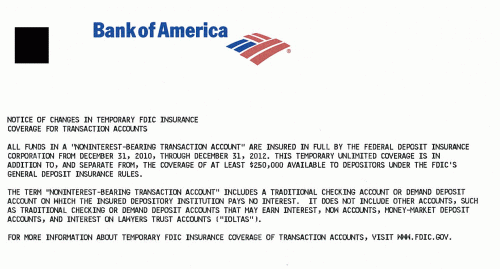Taxpayers to Fund Bank of America Derivatives Losses?
Or maybe it is more correct to say that the taxpayer is being set up to keep BofA counter-parties whole. From Bloomberg, via Zero Hedge:
Bank of America Corp. (BAC), hit by a credit downgrade last month, has moved derivatives from its Merrill Lynch unit to a subsidiary flush with insured deposits, according to people with direct knowledge of the situation.
The Federal Reserve and Federal Deposit Insurance Corp. disagree over the transfers, which are being requested by counterparties, said the people, who asked to remain anonymous because they weren’t authorized to speak publicly. The Fed has signaled that it favors moving the derivatives to give relief to the bank holding company, while the FDIC, which would have to pay off depositors in the event of a bank failure, is objecting, said the people. The bank doesn’t believe regulatory approval is needed, said people with knowledge of its position.
Three years after taxpayers rescued some of the biggest U.S. lenders, regulators are grappling with how to protect FDIC- insured bank accounts from risks generated by investment-banking operations. Bank of America, which got a $45 billion bailout during the financial crisis, had $1.04 trillion in deposits as of midyear, ranking it second among U.S. firms.
“The concern is that there is always an enormous temptation to dump the losers on the insured institution,” said William Black, professor of economics and law at the University of Missouri-Kansas City and a former bank regulator. “We should have fairly tight restrictions on that.”
Obviously I am not a huge fan of bank regulation, but if the taxpayer is going to insure deposits, then the government has got to set and enforce capital restrictions on how those deposits are invested. How many times do we have to learn this lesson? The S&L crisis and the Texas bank collapse of the 1980's was caused by the exact same BS, investing taxpayer insured deposits in increasingly risky investments.
Normally, in a free economy, we expect lenders to enforce rules and discipline on those to whom they lend, just as fire insurers in the 19th century developed the first building codes and inspections to protect their themselves. But if depositors are insured, they are not going to get worked up too much about BofA -- I am a depositor but I know the Feds will make me whole if the bank crashes. Deposit insurance provides comfort to depositors and pays some dividends in heading off bank panics, but at the same time it relieves the bank of any accountability for how the deposits are invested unless the US government takes on that role. Of all the BS regulations financial firms have to put up with, this is the one that should actually exist, and the implication in this article is that despite thousands of pages of new regulation, these basic protections still don't exist. Sure, they exist in law, but there seems to be nothing to stop an agency from issuing exemptions, and this Administration has shown itself to love giving exemptions.
This reminds me a ton of the AIG bailout. For some reason, there are a group of Wall Street companies (cough Goldman cough) that seem to have immense political power to protect investments in which they are a counter-party. To this point, people have been expecting that the BofA holding company might soon fail, but the underlying banks would be fine and just sold off in pretty good shape. Most of the trash is apparently at the holding company level.
The losers in all this are the counter-parties to these various derivatives, who would rather have a better set of assets to grab if the ship starts sinking. Of course, they don't have any right to this -- they didn't make these original deals with the depository banks, they made them with Merrill Lynch and other trash BofA has bought. But never-the-less, the Fed seems fired up to give these guys a special deal. It reminds me of the Solyndra deal where the Administration allowed certain private parties to move ahead of the US Government on the creditor list, though at least in Solyndra's case these parties actually put some money into the pot for the privilege. This seems to be a straight giveaway, and it is no surprise that the FDIC is apoplectic.
